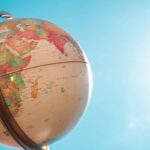Kenya’s international position also gives us hope
For the past two weeks this column has been trying to instil some hope in you, to suggest that maybe, just maybe, things will getter better for Kenya. To end the series, let me move you smoothly to a third reason for hope in 2010: our international position.
If you want to understand Kenya’s role in global affairs, you need to know just three words: location, location, location. We have a large coastline with deep ports; we serve a large economic hinterland; we are an air transport hub; we have temperate climate in an equatorial setting; and we have many neighbours who have systematically butchered themselves and their economies from time to time.
In other words, location makes us very interesting to the rest of the world, and more than a little unnerving. If Kenya goes wrong, many things go wrong for many, many people. Particularly those who depend on us as a supply line (our neighbours); those who see us as a substantial buyer (Britain and others); and those who see us as a bulwark against terrorists (the US).
In 2010, two additional factors bring our position into even sharper focus. The first is that we have a pesky neighbour to the north that is imploding. Somalia, the archetypal failed state, is killing itself and proving a great annoyance to the rest of the world. It is supplying pirates and terrorists in equal measure, and threatening to destabilise international trade and politics.
The second, very unique, development is that we have a sort-of-Kenyan president in the world’s most powerful office. This is very important, but not for the reason you might think. Barack Obama is never going to send us manna from American heaven; but he may well send us something else. Think about it: far from being a source of pride, we are a major embarrassment. Our recent violent conflagration and continuing ineptitude in governing ourselves is acutely discomfiting for Mr Obama: it gives his political opponents great ammunition in painting his origins negatively. How easy it is to point to the president’s fatherland and cast aspersions? To drop not-so-subtle hints that the US president may share a predilection for corruption and mis-governance – just like his forebears?
He will never admit it, but reforming Kenya is high on Mr Obama’s agenda – for a very human reason. We are a thorn in his side, a weak flank, a source of discombobulation.
For many a reason, we are too big too fail. Like many problematic US banks, we will get bailed out until we sort out our act. The world showed last year that it takes Kenya very, very seriously, and it cannot have another major African failure on its hands. The hastily cobbled-together peace accord we signed in early 2008 was not just the work of one Kofi Annan, but of the juggernaut of global interest behind him.
Or did you not wonder why the international community was quietly funding all the peace talks? Did you not ask what messages were being relayed to the two principals, and what deadlines imposed? Did you not query why ol’ Kofi had so much clout? Did you think president Jakayo Kikwete was just representing Tanzania when he flew in to seal the final deal? And now, why is the clamour to end impunity in Kenya trumpeted so loudly from overseas?
This is an interesting position to be in. Let me be clear: I feel as much shame as you do in recognising that Kenya’s salvation may have to be imposed from outside. That is a huge admission of failure, a negation of a hard-fought-for independence. But the fact remains that we are currently incapable of sorting ourselves out by ourselves. One thing is for sure: we are too important out there to be allowed to misrule ourselves anymore. There will be concerted international pressure, and it will be both diplomatic and non-diplomatic.
Someday, we may be able to use this global importance to our advantage. Consider India, another country with an interesting geo-political location. When former president George W. Bush came calling on Indian PM Manmohan Singh in 2006, it was not to utter threats or issue lectures or impose deadlines, even though India had just become a fully fledged nuclear power, much to America’s discomfort. It was to do deals and forge alliances. When America comes to talk to you at the same level, you have arrived, as China and India evidently have.
We are a long way off from enjoying that sort of attention. For now, we must put up with the lecturing, hectoring, condescending type. But those who wish to see a bigger and better Kenya need to put dreams of genuine sovereignty on hold. For now, we must see international pressure as just another driver to force change. In 2010, I hope fervently that all the forces I have highlighted here since the year dawned come to a point and tip us over into a new era.

Buy Sunny Bindra's new book
The X in CX
here »
Popular Posts
- Where are you rushing to—your funeral?June 29, 2025
- The map will appear—once you start walking.July 6, 2025
- How to spot a real thinkerJune 15, 2025
- Built the app, forgot the flowJune 22, 2025















